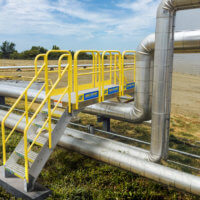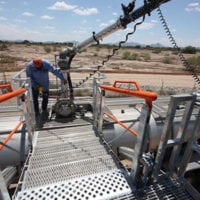A frac tank is a large container that can be used for temporary and portable storage of fluids and chemicals. Capable of storing 10-20,000 gallons of fluids and commonly used in the fracturing of oil and gas wells, but can also be used in the waste industry.
SafeRack offers a complete line of spill containment berms for effective and economical containment of frac tanks, trucks, vehicles, and other large vessels. The UltraTech Foam Wall Plus Model pictured is just one of the many solutions available, each with its own unique features and benefits.
In the waste industry, it may be used if a facility is experiencing a septic backup and needs a place to put the excess waste. Store’s wastewater while adding chemicals to treat that wastewater and then pump it out as treated water. Other uses Farmers would use them for manure storage and even store water in them for watering their animals out in the field.
Benefits of Frac Tanks
- Frac tanks can store large amounts of industrial liquids and proppants.
- Frac tanks can be easily coupled to other devices such as pumps, filters, and other equipment on site.
- Some types of frac tanks help maintain the viscosity of liquids, separate liquids and make the filling or draining process easy.
- There are many frac tank types with smooth walls, corrugated walls, steam coils, rounded bottoms, and more to meet your project needs.
- Frac tanks are highly mobile and can be transported using a truck or a tractor.
- Frac tanks come in different sizes ranging from 7,000 to 21,000 gallon closed-top tanks.
Typical Uses
- Fracking site storage for sand and water
- Groundwater remediation
- Septic wastewater storage
- Freshwater storage
- Agricultural applications: manure management, chemical fertilizing, fuel storage
- Freshwater storage in construction and agricultural industries
- Storing liquids like run-off water, diesel fuel, glycol, and oils in the environmental, agricultural, energy, construction, and chemical industries.
- Containment of dangerous chemicals in environmental applications near fresh water
- Agricultural applications with Mandatory EPA requirements
- Secondary containment of petroleum storage

























